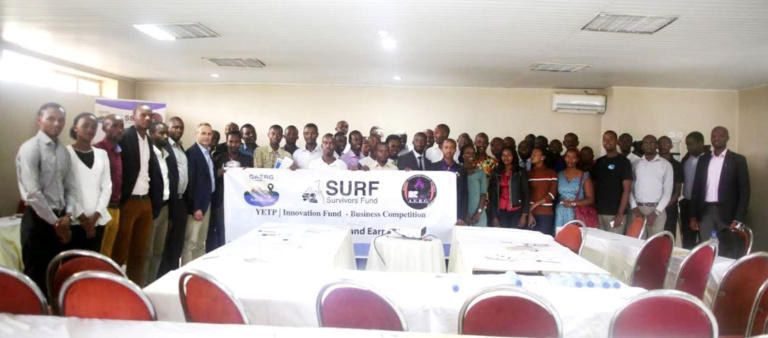
Young Genocide Survivors Turn Sweet Potatoes into Spaghetti, Win Funding.
By Denyse Tuyishime, KT Press.
When the 1994 Genocide against the Tutsi started, Regis Umugiraneza was just four years old living with his family in Kinihira Sector, Ruhango district.
The interahamwe militia killed Umugiraneza’s father and brother but his mother survived embarking on a struggle to provide for her son.
Umugiraneza always wondered why his family was suffering but had no answer. He also failed to understand why many children were dying early.
He recalls in 1999 when he was in primary school, his neighbour lost a son due to malnutrition although the family thought he died of meningitis.
“Indeed the family was too poor to afford a meal. We were very poor too. I started thinking about what I could do to save my village despite my young age. This triggered my desire to become a doctor,” Umugiraneza narrated to KTPress.
While in college Umugiraneza studied Bio-Chemistry -this is when he began thinking of how to assist his village.
“I realised we had been feeding on sweet potatoes only, without any other alternative diet. I wondered if there was no other way sweet potatoes could be processed, especially the orange coloured potatoes rich in Vitamin A,” he recalls.
When Umugiraneza joined university in 2013 in the faculty of Agri Business, he already had a clear idea. “I designed a project about processing orange sweet potatoes into Spaghetti but surprisingly many people laughed at me saying it was a stupid idea,” he told KT Press.
“But my lecturer encouraged me to go ahead.” Umugiraneza then approached four classmates and they started CARL Group (Clarisse, Ada, Regis and Larissa) a company that would later work to add value to sweet potatoes. “We started producing bread but still with an idea to make spaghetti,” he said.

Umugiraneza’s dream might soon come true
He is among four young business entrepreneurs that won a total Rwf24 million worth of grant from the ‘Innovation Fund Business Competition’ organized by Genocide Survivors Associations – SURF under Youth Employment Training Program on September 5th.
Other young entrepreneurs awarded a grant are Protais Zigama proprietor of TRIPRO Business Group, a maize processing company.
Yubeyi – an online shopping App by Christophe Nkurunziza and Neberi Group which runs an App that is used for web design will also get a share of the grant.
The four finalists were selected among 16 projects after a tight competition on Tuesday.
“We have considered the ‘ready criteria’ in selecting winners; all projects are good but some project owners are not ready yet; they presented their project before us but did not request any funding while it was the only reason of the competition,” said Peter Rwema, the Director of Association of Microfinance Institutions in Rwanda (AMIR) and one of the five judges.
For Zigama it was a different scenario; While presenting his project, he requested Rwf7M funding.
“I am very excited for having won this competition. With the funding, I will be able to buy a brand new machine to improve my business,” Zigama told KT Press.
Zigama’s TRIPRO Investment group is located in Kamonyi. It started operating in 2015 with an investment capital of Rwf600,000. With 13 employees, the company earns Rwf5 million annually.
The competition was organized by Rwandan Graduates Genocide Survivors Association (GAERG), the Association of Student Survivors of Genocide (AERG) in collaboration with Survivors Fund (SURF), a nonprofit organization to support youth genocide survivors.
The funding is part of the $50,000 (Rwf42.1M) donated by Andre Cohen, an American entrepreneur who pledged to assist the Fund since 2013 while he was on a trip in Rwanda.
According to Olivier Mazimpaka, the GAERG President, the grant will be recovered to help other entrepreneurs.
“The money is a grant meant to help business owners to grow their business, it will be recovered as we will agree,” said Mazimpaka.
Since 2012, under the Youth Entrepreneurship Training Program (YETP) AERG, GARG and SURF has been supported by different donors, have trained about 800 young people to start their own business as part of the government policy to create 200, 000 jobs per year.
Meanwhile, CARL needs funding to buy sweet potato processing machines.“We need almost Rwf 13 million, we are happy we will get some money from the competition,” said Umugwaneza. “We have partnered with Oklahoma University from US for the extended research about pasta processing. In three years, we will be producing pasta,” Umugiraneza said.
